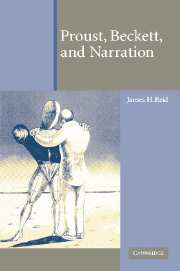Book contents
- Frontmatter
- Contents
- List of abbreviations
- Introduction
- 1 Remembering forgetting: Le Drame du coucher
- 2 Impressions, the instant of artistic consciousness, and social history
- 3 Lying, irony, and power: Proust's deceptive allegories
- 4 Proust's forgetful ironies
- 5 Molloy's Way: The parody of allegory
- 6 Moran's Way: The forgetful spiral of irony
- 7 Malone Dies and the impossibility of not saying I
- 8 The Unnamable: The death of the ironical self and the return of history
- Notes
- Bibliography
- Index
3 - Lying, irony, and power: Proust's deceptive allegories
Published online by Cambridge University Press: 22 September 2009
- Frontmatter
- Contents
- List of abbreviations
- Introduction
- 1 Remembering forgetting: Le Drame du coucher
- 2 Impressions, the instant of artistic consciousness, and social history
- 3 Lying, irony, and power: Proust's deceptive allegories
- 4 Proust's forgetful ironies
- 5 Molloy's Way: The parody of allegory
- 6 Moran's Way: The forgetful spiral of irony
- 7 Malone Dies and the impossibility of not saying I
- 8 The Unnamable: The death of the ironical self and the return of history
- Notes
- Bibliography
- Index
Summary
I have argued that the story of Marcel's search to remember unique past selves and to write an autobiography is riddled with forgetting. It turns out to be an allegory of the narrator's deconstruction of the distinction between remembering and forgetting, which makes possible an autobiographical search for the past, and an allegorical deferral of this search. Allegory repeatedly puts itself into question and opens up the possibility that the narrator's allegory is an illusion created by a fundamentally ironical narrator. The story of Marcel's search for self thus produces not only two representations of the present instant of the first-person narrator's discourse – the allegorical aspect of the present as the temporal flight of the personal present into forgetting and the ironical aspect of the present as that which produces and negates signs of the personal and of time – it dramatizes a redefinition of allegory as a product of irony. Only indirectly do the passages we have studied suggest the reverse transformation. It is time to explore the story of Marcel's search to become an ironical, rather than an allegorical, writer.
The ironical reading of first-person narration in the Recherche is rooted in the narrator's dramatization of, and commentary on, lying in love, art, and society. Irony, like lying, invents a representation of reality. But it includes indirect signs that disclose this misrepresentation. The roles of lying and irony, like those of forgetting, create an essential bridge between Proust's narrator and Beckett's narrators in his later trilogy.
- Type
- Chapter
- Information
- Proust, Beckett, and Narration , pp. 46 - 68Publisher: Cambridge University PressPrint publication year: 2003



